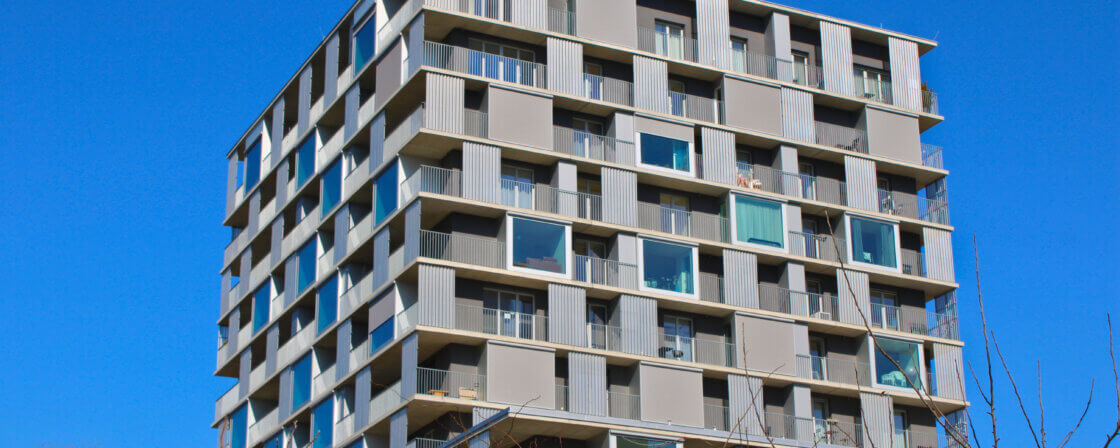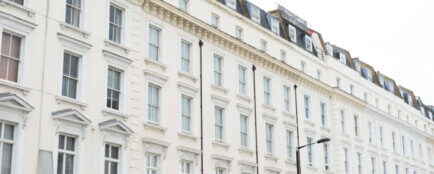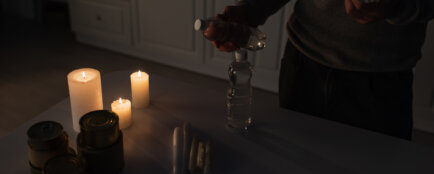Who’s in charge of the window cleaning?
A client contacted the Accessible Advocate with a question about the maintenance of windows in an apartment building managed by a unit owners’ association. Specifically, the issue was who should be responsible for cleaning the windows on the outside. These windows could not be opened and therefore had to be cleaned by a professional company. The committee of the HOA could not agree on whether the HOA should cover the cost of the cleaning or only the owners of the flats in whose units the windows were located.
From the SVJ’s point of view, there was a contradiction between the two pieces of information in the Civil Code and they did not know how it should legally work. These were the two parts of the Civil Code:
- Sections 1175 and 1180 state that “the owner of a unit shall manage his apartment as required by the sound condition and good appearance of the building; however, in the case of common areas within the apartment and common areas that serve the exclusive use of the unit owner, he shall only perform and pay for maintenance and minor repairs.” and that “the unit owner shall contribute to the management of the house and the land in proportion to his share of the common parts, unless otherwise specified in the declaration, having regard in particular to the nature, dimensions and location of the common part which is for the exclusive use of a unit owner and the extent of the unit owner’s obligation to manage that part at his own expense.”
- In turn, one can read in the provisions of Section 1189 that “the management of the house and grounds includes everything not belonging to the unit owner which is necessary or expedient in the interest of all the co-owners for the proper care of the house and grounds as a functional unit and the preservation or improvement of the common parts. The management of the house and the land includes activities relating to the maintenance and repair of the common parts, the preparation and implementation of changes to the common parts of the house by extension, addition, alteration or change of use, and the establishment, maintenance or improvement of facilities in the house or on the land serving all the co-owners of the house. The administration shall be deemed to extend to common parts which are for the exclusive use of a co-owner.‘
Tip for article
Are you a member of the SVJ committee or the board of directors of a housing cooperative? Do you deal with complex legal situations with owners or members of the cooperative that you do not know how to handle? Or do you believe that someone has taken the wrong legal action against you? Arrange with us to represent you at a meeting of owners or members of a condominium association.
The client provided us with, among other things, the Articles of Association of the JVU and the Owner’s Declaration, on which we partly relied.
What did the bylaws say?
The articles of association of the HOA, which were provided to us by the client, provided that the HOA had the capacity to acquire rights and undertake obligations only in matters relating to the management, operation and repair of the common parts of the house and land. The HOA then collected predetermined funds from its members for this management of the house.
The statutes further provided that the obligations of a member of the HOA included, inter alia, the obligation to pay dues for the management of the building and to maintain his unit as required for the sound condition and good appearance of the building (see § 1175), which also applied to the common areas of the building reserved for the exclusive use of the unit owner.
What did the owner’s declaration say?
The owner’s declaration defined the units and the common areas of the house. Specifically, it stated that each dwelling unit included floor coverings, interior sills, furnishings, data network wiring, electrical wiring, water wiring, and HVAC wiring.
For some dwelling units it was further specified that they include (are defined by) the internal surfaces of the external walls of that spatially separated part of the house, the floor (internal floor surface), the ceiling and the fillings of the building openings in the walls enclosing that unit.
The common parts of the house then, according to the owner’s declaration, included the roof of the house including the fills of the entrance openings, the fills of the construction openings on the facade (windows and doors) with the exception of the construction openings in the perimeter walls of the units, and the residential entrance door.
Some of the common parts of the immovable property thus defined were then designated for the exclusive use of the owners of only some of the units (those to which they are adjacent), namely, inter alia, the fillings of the building openings, without specifying exactly which of those so far referred to are, but it can nevertheless be inferred that both windows and doors are obviously meant.
The owner’s declaration then went on to stipulate that the unit owners, according to the size of their ownership shares in the common parts, were obliged to contribute to the management of the building, with the proviso that those management costs included, inter alia, the costs of maintenance and repair of the common parts of the building and the land.
The House Rules then provided that the HOA was obliged to carry out, at its own expense, the proper maintenance and necessary repairs of the house and its common areas. The unit owners then had a duty to ensure, at their own expense, the proper and timely carrying out of repairs in the unit and all work connected with the normal maintenance of the unit, its fixtures and fittings, including any greenery in the common areas with exclusive right of use.
Are you solving a similar problem?
Need help with the statutes?
We will check your articles of association of a condominium or housing cooperative or we will write them for you from scratch. We will always make sure that they comply with the current legislation. The statutes prepared by us are always tailored to the needs of the residents of the building. We can also set up a JVU or housing cooperative for you on a turnkey basis. We will arrange everything quickly, flawlessly and at pre-determined prices. You can pay only after the service has been provided.
I want to help
- When you order, you know what you will get and how much it will cost.
- We handle everything online or in person at one of our 6 offices.
- We handle 8 out of 10 requests within 2 working days.
- We have specialists for every field of law.
What does this imply?
Based on an analysis of the submitted documents, it can be tentatively concluded that all of the building opening panels (windows and doors) are common parts of the building, with the sole exception that only the interior surfaces of these building opening panels in the walls bounding the unit constitute a dwelling unit, which includes, but is not limited to, the interior surface of the entrance door to the unit.
The building opening panels themselves (windows and doors), as common parts of the building, are then left to the exclusive use of the owners of the units to which the building opening panels (windows and doors) in question are adjacent.
Thus, the intent of the Owner’s Declaration was presumably to leave the exclusive use of the windows within the condominium unit, including their exterior portion, and the associated maintenance responsibilities. In the case of fixed and non-opening windows, however, it is more than questionable whether the giving of exclusive use of the external surface of such a window actually took place at all (the owner cannot actually “use” the external part of the window at all).
It is not disputed that all unit owners are thus obliged to maintain the common parts of the building so “assigned” to their exclusive use in a manner required by the sound condition and good appearance of the building, which follows, inter alia, directly from the provisions of § 1175 (see above), which provides that, that the unit owner shall maintain his or her apartment as required by the sound condition and good appearance of the building, provided that, with respect to the common areas within the apartment and the common areas which are for the exclusive use of the unit owner, he or she shall perform and pay for only maintenance and minor repairs with respect thereto.
However, it should be emphasised in this context that the unit owner does not manage the common parts of the house so ‘allocated’ – unlike the flat – (this is also apparent from the express phrase ‘maintains’ and ‘repairs’, which is only a sub-part of the broader concept of ‘management’), since the management of such common parts of the house (albeit given for the exclusive use of the unit owner) is still carried out by the HOA, not only because it is a matter that does not belong to the unit owner, but also because the law expressly provides that the management of the house and land extends to the common parts of the house that are for the exclusive use of a unit owner (see § 1189).
As regards the actual maintenance (or repairs) of the common parts given to the exclusive use of the unit owner, it is true that this is primarily in the hands of the unit owner concerned, who carries out (or arranges for the carrying out of) and pays for it, but a certain conflict with the above-mentioned provision of § 1189 according to which the management of the house (including the common parts) is carried out by the HOA cannot be overlooked in this sense, whereby such management of the house includes not only that which does not belong to the unit owner, which by its very nature is the common parts of the house (including those given to the exclusive use of a unit owner), but also that and what is necessary or expedient in the interest of all co-owners for the proper care of the house as a functional unit and the preservation or improvement of the common parts (including those given to the exclusive use of a unit owner).
The management of the house by the HOA, so defined, also includes maintenance and repairs, it being necessary to conclude that the nature of such maintenance and repairs is defined by the ‘interest of all the shareholders‘, whether in relation to the necessary and expedient care of the house as a functional unit or in relation to the maintenance or improvement of the common parts.
In the sense thus described, it can then be inferred that the legislator intended to divide the maintenance (repair) of the common parts in exclusive use between the respective unit owner and the HOA itself, since in this respect the division of the costs of such maintenance (repair) of the common parts in exclusive use between the unit owner and the HOA itself is also expressly envisaged, which is implicit in the provisions of section 1180, according to which the unit owner contributes to the maintenance of the building not only in the proportion corresponding to his share in the common parts, but also taking into account the nature, dimensions and location of the common parts which serve only some unit owner for exclusive use, and the extent of the obligation of such unit owner to “manage” this part at his own expense.
In this respect, the quoted provision envisages an important role of the owner’s declaration, which not only determines the very extent of the owner’s obligation to maintain and repair the common parts of the building in his exclusive use, and thus indirectly also the extent of the obligation of the HOA to maintain and repair these parts as well (taking into account the above-mentioned corrective “interest of all the shareholders” in the necessary and efficient care of the building as a functional unit, as well as the ‘interest of all the shareholders’ in the maintenance or improvement of the common parts), but it will also determine the solution of the actual cost aspect of such maintenance (repair) of the common parts in exclusive use, in terms of determining the amount of such unit owner’s contributions taking into account his exclusive use of such common parts.
Section 1180 thus provides for a special case of the key to determining the amount of the contribution, for which it is possible to determine in the owner’s declaration, for example, that the unit owner will “maintain” the common part of the building so defined entirely at his own expense (yet with the consent of the HOA, as it is a common part), or, for example, that such unit owner will make some financial contribution to the HOA for the shared maintenance (repair) and how, or a combination of both schemes.
The unit owner is otherwise generally obliged to make contributions to these common parts in his exclusive use, as well as to maintain them at his own expense, to the extent that the common parts in exclusive use are not contributed to directly by the HOA.
However, an analysis of the documents submitted shows that the Owner’s Declaration not only does not define the specific scope of the unit owner’s obligations with respect to the common areas in his exclusive use, but also does not address at all the cost issue of maintenance (repair) of such common areas, whether performed by the owner within the meaning of § 1175, which corrects such maintenance (repairs) of the common parts in exclusive use by the requirement of a ‘sound condition and good appearance‘, or carried out by the HOA within the meaning of the provisions of § 1189 in conjunction with the provision which corrects such maintenance (repairs) of the common parts in exclusive use by the requirement of ‘the interest of all the shareholders‘ in the necessary and efficient care of the house as a functional unit or in the preservation and improvement of the common parts of the house.
In such a case, it is therefore quite logical that a dispute may easily arise between the HOA and the unit owner as to who is responsible for the specific maintenance (repair) of the common parts in exclusive use and who should bear the costs thereof.
Are you solving a similar problem?
Need help with the statutes?
We will check your articles of association of a condominium or housing cooperative or we will write them for you from scratch. We will always make sure that they comply with the current legislation. The statutes prepared by us are always tailored to the needs of the residents of the building. We can also set up a JVU or housing cooperative for you on a turnkey basis. We will arrange everything quickly, flawlessly and at pre-determined prices. You can pay only after the service has been provided.
I want to help
- When you order, you know what you will get and how much it will cost.
- We handle everything online or in person at one of our 6 offices.
- We handle 8 out of 10 requests within 2 working days.
- We have specialists for every field of law.
So how to deal with the situation?
If the Owner’s Declaration, as well as the SVJ Statutes, which are also silent on this issue, do not determine the level of maintenance (repairs) of the common parts in exclusive use and the related amount of contributions, it is necessary to proceed from the general premise = for the “normal” maintenance (minor repairs) of the common parts of the house in exclusive use is the responsibility of the unit owner, while for other maintenance (“minor” repairs), which is already related to the functionality of these common parts and their preservation is the responsibility of the SVJ.
What constitutes ‘ordinary’ maintenance (or ‘minor’ repairs) is set out in a number of regulations. As a guide, for example, the Government Regulation on the definition of the concepts of routine maintenance and minor repairs related to the use of the flat can be used, which, although it defines the concept of “routine” maintenance and “minor” repairs in relation to the flat and its use when renting the flat, it can also be used as a subsidiary regulation in relation to the common parts of the house (premises) in exclusive use.
In general, it is the nature of the activity carried out in relation to the function of the parts of the house (premises) that is decisive for the maintenance and repair of the relevant parts of the house (premises). In this respect, there can be no dispute that the maintenance (repair) which is intended to ensure, for example, the structural and technical function of the premises as a common part of the house should always be carried out by the HOA.
As regards other maintenance (repairs), the above-mentioned government regulation shows a division both in terms of the subject matter (i.e. the list of specific activities that are considered as “routine” maintenance or “minor” repairs) and in terms of the amount of the cost of carrying them out.
‘Ordinary’ maintenance, which generally means the maintenance and cleaning of the dwelling, including the furnishings and fittings of the dwelling, which is normally carried out during the use of the dwelling, includes, in substantive terms, e.g. painting, plaster repairs, cleaning of floors, wall coverings, etc. ‘Minor’ repairs include, for example, repairs to individual upper parts of floors, repairs to floor coverings and replacement of thresholds, repairs to individual parts of doors and windows and their components, fittings and handles, etc. According to the amount of the cost, other repairs are also considered ‘minor’ repairs if the cost of one repair does not exceed CZK 1 000, provided that if several repairs are carried out on the same item which are related and connected in time, the sum of the costs of the related repairs is decisive.
In this context, it is therefore certainly advisable to recommend that similar criteria for ‘routine’ maintenance and ‘minor’ repairs be used by the JVU to prepare its own rules for the treatment of the common parts of the building in exclusive use and to determine the payment of the associated costs in the JVU Statutes.
In the context of the above, the above-mentioned issue of maintenance of windows, which are designated by the Owner’s Declaration as common parts of the building for the exclusive use of the owners of the units to which these windows belong, can be assessed – although there is no doubt in general terms, that the actual washing of windows (both inside and outside) can be considered as “routine” maintenance, which is usually carried out by the respective unit owner at his own expense, the prerequisite for such an obligation on the part of the owner is that the window is capable of such “routine” maintenance (washing) at all, i.e. it can be opened.
Tip for article
What repairs and adjustments can you make in the apartment? What do you have to take care of, what does the tenant have to take care of, and what does the housing association or HOA have to take care of? Find out in the next article.
However, in the case of fixed and non-opening windows that by their nature do not allow the unit owner to fully maintain them, especially from the outside (i.e., open such windows and wash them in the usual and expected manner), we hold that this is no longer “routine” maintenance because the unit owner cannot be fairly required to do so, in the context of his obligation to maintain those parts of the building in a ‘state of good repair and appearance’ – to be obliged to carry out such maintenance, which even presupposes the presence of specialist firms, on his own and even at his own expense, which, in view of the necessary presence of a specialist firm, is already beyond any doubt beyond the scope of ‘ordinary’ and usual.
In our view, the ‘interest of all the co-owners’ already prevails in this respect , not only in the necessary and expedient care of the house, which the HOA is by law responsible for at its own expense, but also in maintaining the uniform appearance of the house, where there is sufficient justification for the HOA to carry out such ‘extraordinary’ maintenance itself, and even more efficiently and economically (i.e. to ensure that all the unopenable windows are washed at once).c
Tip for article
As you can see in this case, it does not pay to underestimate the statute. Let our attorneys help you. We will see that your statutes are in compliance with the law. We will set up a turnkey unit owners association or condominium for you. We will draft or review the bylaws of your HOA or condominium association. We will also take care of the follow-up process for the formation of the HOA or condominium.
Summary
It can be summarized that in general the costs of maintenance (repair) of common parts in exclusive use should be paid according to the key specified in the Owner’s Declaration (or at least in the Articles of Association of the JVU). In the apparent absence of such a regulation, such maintenance (repair) should be carried out according to the nature of the maintenance (repair) concerned, which means in particular that the costs of “ordinary” maintenance (“minor” repairs) should be borne by the unit owner, the rest at the expense of the HOA.
In the case of the washing of fixed and non-opening windows, we consider that, in view of the manner in which such maintenance is carried out with the involvement of a specialised company, it is no longer ‘ordinary’ and usual maintenance, but rather ‘extraordinary’ maintenance, carried out in the ‘interest of all the shareholders’ for the necessary and expedient care of the house (and, consequently, in the interest of maintaining the uniform appearance of the house).
For this reason, such maintenance of windows (only fixed and non-opening windows are concerned) should therefore be carried out by the HOA, at its own expense. The contributions of the unit owners to the common management of the building serve this purpose (although, to date, neither the owner’s declaration nor the articles of association of the HOA expressly provide for such a contribution, even with regard to the exclusive use of such parts of the building).
In any case, in the future, we recommend that the JVU should at least directly specify in the JVU Articles of Association according to which key the respective contributions for the management of the house and land will be calculated in relation to the common parts of the house (premises) in exclusive use and define in more detail the level of maintenance (repair) to which the individual unit owners who exclusively use the respective parts of the house (premises) will be obliged.
Furthermore, we would recommend that the HOA should explicitly determine which types of maintenance (repairs) that may affect the overall appearance of the common parts in exclusive use should be left to the HOA, even though they would otherwise be “routine” maintenance or minor repairs (e.g. the aforementioned issue of painting or repair of the common parts or glazing of loggias, etc.).




